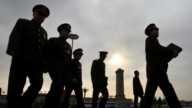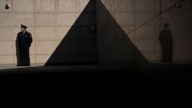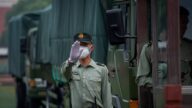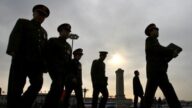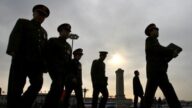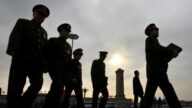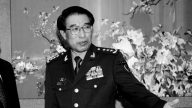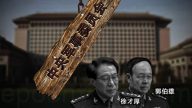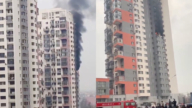【新唐人2013年05月27日讯】中共中央军委主席习近平最近再出重拳,整治军队,声称要对军队住房方面的贪腐之风进行治理,将严打军中高级将领违规超标占用豪宅、以及非法转售军地牟利等现象。消息说,习近平这次整治,起因于前总后勤部副部长谷俊山中将贪腐案。据传,谷俊山在北京豪华地段建造了一座极为奢华的豪宅,号称“将军府”。
习近平就任中共军委主席之后,曾先后推出“禁酒令”、和“禁豪车”等措施,惩治军中腐败。最近中央军委又发出通知,要求军队纠正治理在住房方面的“不正之风”。这包括:将严打高级将领超标占用豪宅、以及非法转售军用土地牟利等贪腐行为。
政论家伍凡:“现在这些将军们,既不打仗,又不操练,养尊处优,住的比宾馆还要高级。所以习近平想在这个地方来开刀,来整治军队。”
政论家伍凡同时指出,中共军队贪腐极其严重,除了住房问题之外,买官卖官、经商、走私等现象都很普遍。而且大多军队高级将领都有“太子党”背景,后台很硬,习近平要整治军队将遇到很多困难。
伍凡:“能不能用这个行动来治理军队,我看做不到。因为军队60多年来,除了一些部队打仗,其他都是养尊处优,是镇压老百姓、欺负老百姓的。”
伍凡表示,即使习近平下决心整治军队,一方面军队会抵制,另一方面,对于中共来说时间越来越少,很可能治理还没见到成效,老百姓就已经起来造反了。
有香港媒体报导说,习近平整治军队违规住房,起因于前军队总后勤部副部长谷俊山中将贪腐案。
曾经担任总后勤部基建营房部副部长等职的谷俊山,被指出,在北京等地有多处豪宅。其中,在北京朝阳区寸土寸金的中央商务区(CBD),谷俊山拥有一个占地20多亩的官邸,里面有多座别墅群,极为奢华。这一府邸被称为“将军府”,据说,院子里的每一棵树价值都在40万以上。
此外,中共军队还普遍利用军事用地,建造商业或住宅楼出售,来牟取暴利。
对此,时事评论员文昭表示,军队系统的腐败由来已久,早在上世纪90年代,军队就开始以演习为名、通过海军船只走私汽车等紧俏商品,牟取暴利。
时事评论员文昭:“军队的门阀派系甚至比一般的党委、政府还要严重。它这个势力盘根错节。所以在军队里面反腐,比在政府系统难度还要大一些。因为太子党的根基很深,而且它的封闭性很强。”
文昭还指出,真正反腐败需要一种监督机制,这就必须改变中国大陆当前的权力基本结构。
文昭:“整个共产党的高层体系,它的权力是不受监督的。太子党牵扯的面很广,它把握了中国所有的关键权力部门。所以你想在军队里面深入下去(反腐),它还不仅仅是军队的问题,它还会方方面面牵扯到整个权力结构的其他环节。”
文昭强调,中共信奉“枪杆子里面出政权”,中共元老纷纷安插自己子弟在军队的各个重要位置,这造成军中太子党的强势。如果当局在军中深入反腐,就会打破这种权力结构,从而危及中共政权,所以习近平不可能在军中进行真正的反腐。
采访/田净 编辑/李谦 后制/周天
Gu Junshan’s Luxury Mansion Faces Xi Jinping’s Corruption Probe
The Communist Chinese Central Military Commission
Chairman Xi Jinping is cracking down on the military.
He claims to fix corruption in the army.
He forbids seniors officers to occupy luxury mansions or to
make a profit through illegally selling military lands.
Xi Jinping’s crack down on army corruption
was said to be due to pressure from Gu Junshan,
former deputy head of the People’s Liberation
Army General Logistics Department.
His luxury mansion in Beijing was known as
“the general’s quarters."
As new chairman of Central Military Commission,
earlier Xi Jinping had announced his
anti-corruption regulations for the army.
They forbid drinking of hard liquor and
the use of luxury cars.
Another new regulation was recently issued forbidding
ownership of luxury mansions and
the sale of military owned land by senior officers.
Political commentator Wu Fan:
“None of these generals have experienced a war.
They do not function militarily, but live in luxury.
Xi Jinping is using these men to discipline the army."
Wu Fan indicates that corruption is endemic
in the Chinese military, in the housing market,
and in the buying and selling of officer titles,
engaging in all kinds of business and smuggling and so forth.
The majority senior officers are princelings,
who have a strong political background.
He believes Xi Jinping is bound to meet
difficulties in trying to fix the army.
Wu Fan: “I don’t believe his measures will fix the military.
For more than 60 years, the military has engaged in nothing
but taking advantage of the people."
Wu Fan says that not only will the army resist Xi Jinping’s
discipline, but also the people have lost their patience.
Before any effect of the anti-corruption drive is seen,
people may already rebel.
According to Hong Kong media reports,
Xi’s ruling against luxury housing in the military was
prompted with the corruption case of Gu Junshan,
Gu was formerly deputy head of the People’s
Liberation Army General Logistics Department.
Gu Junshan was said to own many mansions in Beijing.
In the Central Business District,
in the most expensive area of Chaoyang, Beijing,
Gu Junshan owned a compound known as
“the general’s quarters", a block occupying more than 20 mu of land.
Each tree inside the compound was said
to cost at least 400,000 yuans.
Military officers also profit through the military land by
building commercial or residential buildings for sale.
Political commentator Wen Zhao indicates that
military corruption Had already started as early as in the 1990s.
The army profiteered through smuggling cars and commercial
goods using naval vessels, in the name of military exercises.
Wen Zhao: “The army factions struggle is more severe than
the Communist Party Committees and the regime.
Resistance in the army will be much tougher than resistance
in the regime. Princelings have a very deep root in the army."
Wen Zhao says that the fundamental anti-corruption drive
requires a monitoring mechanism which calls for power change.
Wen Zhao: “The entire power of the senior
Communist system is unsupervised.
Princelings control multiple power sectors of the regime.
Corruption in the army covers the entire
power structure of the regime."
Wen Zhao stresses that the Communist Party believes
that power lies in the gun.
Senior cadres place their children in multiple important
positions in the army and princelings are strong in the army.
Anti-corruption in the army will break the power structure
and endanger the Communist regime.
Xi Jinping’s military anti-corruption drive
will therefore only be superficial.


